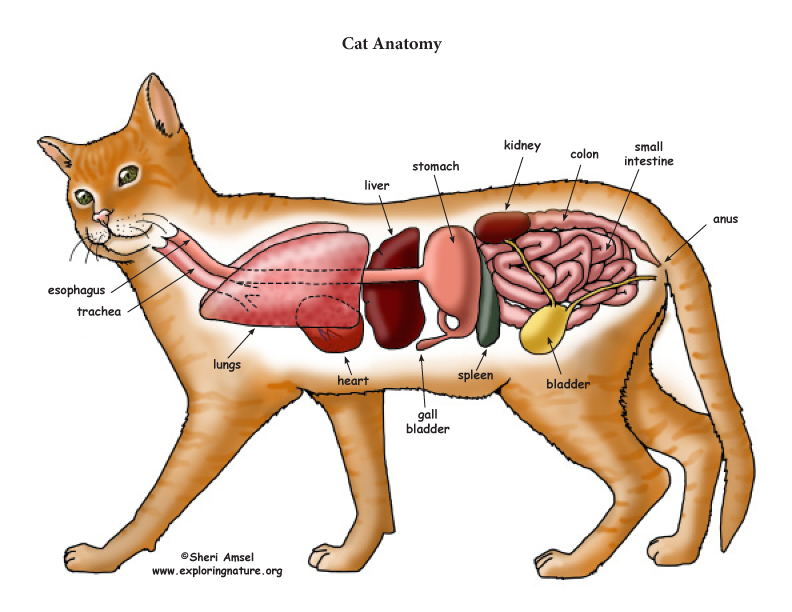As stated in other answers, cats are obligate carnivores. This means that their entire biological design has been hyper-optimized for consumption of meat.
https://en.wikipedia.org/wiki/Carnivore#Obligate_carnivores
This is different for dogs and humans. Humans are full-on omnivores, able to eat almost anything. Wolves, and therefore the related Dogs, are also omnivores. As long as you hit the right nutrition level, both humans and dogs will happily survive on an vegan diet.
Part of this has to do with where our species came from, evolutionarily. Humans are hunters and gatherers; we have large caloric needs and developed over time the ability to subsist on meat as well as vegetation. Agriculture provided us with stationary food sources, and animal husbandry allowed us to do the same for animal products. We no longer needed to hunt or gather, but here's the key part:
As far as evolution is concerned, we have the same digestive systems as our hunting and gathering generations.
Evolution is a very, very slow process.
Dogs joined the Human circle when wolves, who were already omnivorous, teamed up with omnivorous humans. We humans were way more effective at our hunting and gathering with wolves around, and wolves found themselves provided with plenty of comparatively easy nutrition. As humanity moved from roving bands to agriculture, wolves were selectively bred into various useful breeds; but at the core, the dog you see on a leash in Paris is the same family of animals that traces back to the omnivorous wolves they came from.
Cats have a different history. While dogs joined the tribe back during the hunting and gathering era, cats joined us only after the agricultural revolution. The problem was mice. Humans would spend massive efforts growing and storing grain, only for those little critters to sneak in and eat or spoil it all. Humans needed a solution, and nature had one specifically designed for the job.
Cats have always been the obligate carnivores they are now. We hired them for a specific job which required them to be obligate carnivores. They are finely tuned machines designed for eating the critters trying to ruin your vegan diet.
Just like a few ten thousand years worth of breeding didn't change the underlying biology of dogs, a few thousand years worth of husbandry hasn't changed cats.
It all comes down to intestines. Plant based foods require more digestive work to get the nutrients out than meat, because meat is already almost in the exact form your body needs it; the protein composition is exactly what you need. With plant based foods, you either need complex chemistry to break them down or more work in the gut.
Humans and dogs have relatively long intestines. They're all coiled up inside to pack it all in. Cats don't have this at all. The entire digestive apparatus exists between the back legs.

There's literally not enough linear space for cats to digest plant based foods. The foods they eat must be easily digestible by their hyper-optimized-for-hunting-meat digestive systems.
Now, you can get close. Engineered cat foods based on plant proteins, specifically provided with synthesized molecules required for their diet can fill the niche. Basically, much of the chemistry that happens in your digestive system has to happen in a food laboratory or factory to get food to the point that kitty can eat it.
You need to be careful doing this, and be really good friends with your vet, so they can keep an eye on your cat's health.
Heck, most off-the-shelf cat foods are made with tons of plant fillers, so we know cats CAN eat vegetation. But they don't get much food value from it.
If you're an "environmental" vegan, you also need to consider the energy inputs required to convert plant based foods into something your meat-optimized buddy can consume. Because there's a lot of scientific and engineering work required to convert purely plant base stock into something your cat can eat. And those vital molecules required in their diets, the stuff they can't synthesize like taurine, must be assembled in a factory as well.
One final thought: unless the entire population of the planet completely converts to veganism, there will ALWAYS be meat production. No matter how you feel about it, as long as there's one person out there who likes steak, there will be animals butchered for it. And much of that butchered animal isn't top quality meat from the steak-eater's perspective. But all that "waste" is perfectly palatable for kitty, with a minimal amount of preparation and processing. It hits all the checkmarks of what your cat's biology needs, and hits all the taste and quality of life metrics you cat's brain is looking for.
Because that waste exists anyway, and your choice to feed your cat biologically compatible food isn't the cause of the animal being butchered... I would make the argument that letting kitty eat the waste is way better than that waste just being wasted.
Now, I'm not saying you should go to the local butcher shop and get a sack of scraps and process it at home. Most cat foods on the market, however, use this perfectly-acceptable-to-a-cat waste to generate kibble that your cat can eat. Just don't get the high-end brands that advertise using "human grade" meat, because that basically is just feeding kitty a steak. And I would personally avoid tuna, because tuna has a hard enough time as it is, and there's not much waste in tuna.
Getting a middle value off-the-shelf cat food will provide your cat with everything it needs, give it the proteins and molecules it needs from animal sources, and fill the rest of it with plant-based ingredients. Your cat will be healthier, and you won't be having to become a Ph.D. in veterinary chemistry to make sure your cat gets all it needs.
Remember, cats are not omnivores, and therefore they will not survive on a purely plant based diet without massive engineering effort.
